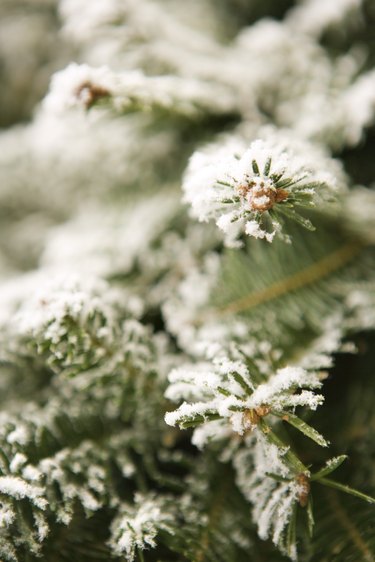
Transplanting a dwarf Alberta spruce can be a major undertaking. Dwarf Alberta spruce, or Picea glauca Conica, is often grown as a formal foundation shrub. This pyramidal evergreen grows slowly but can reach a maximum height of about 10 feet tall and 3 feet wide. This shrub is inexpensive, and it may be much easier to replace it than to relocate it. But if your dwarf Alberta spruce is large, old, has sentimental value and needs to be moved, take care in removing and transplanting the specimen. Most transplanting problems occur when the root ball is damaged during the digging process or the shrub was planted too deeply.
Problems
Video of the Day
Problems that can occur when transplanting a dwarf Alberta spruce can include chlorosis (yellowing of the needles), leaf scorch (brown tips and edges of the needles), needle drop and die-back of needles, twigs and branches. If any of these situations arise, the shrub may have been improperly transplanted or suffered root damage during the move.
Video of the Day
Roots
Cutting off major roots during transplanting causes the shrub to decline or die. If the roots are damaged, the shrub will be unable to obtain water and nutrients from the soil. ''This Old House'' landscape contractor Roger Cook recommends digging a root ball 1 foot wide for every 18 inches of the shrub's height. Carefully remove the root ball and wrap it in wet burlap. Dig a hole three times the width of the root ball in the new location.
Depth
Always transplant a shrub at the same level at which it was previously planted. The top of the root ball should be at the soil surface. If the shrub is planted too deep, the roots won't be able to obtain adequate amounts of oxygen, will suffocate and die. Yellowing, scorching and die-back of the needles are indications that shrub was planted too deep.
Tips
To help ward off problems when transplanting a dwarf Alberta spruce, use a liquid fertilizer with a root stimulator. There are several types available at nurseries and home and garden centers. Water frequently for the first season, but allow the shrub to dry between watering. To ensure the best chance of success, plant dwarf Alberta spruce in full sun a few feet away from any structure. Adequate air circulation is essential for this shrub, as it is susceptible to mite infestation and moisture damage. Transplant in spring or fall.